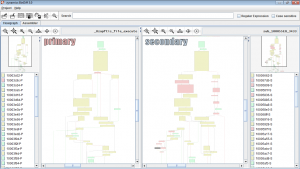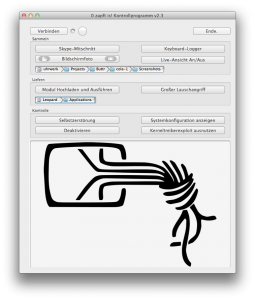(English translation of the original german version)
Lately the Chaos Computer Club (CCC) has recently received a newer version of the “Staatstrojaner”. The comparison with the older version, already analysed by the CCC with the actual Sniffer-code from December 2010, revealed new evidence. Despite the claims of the responsible parties, the trojan can still be captured, loaded with any code and also the allegedly “audit trail” can be manipulated. The CCC is calling for a complete waiver of Trojans in pre-trial applications.

On October 8th 2011, the CCC published the documentation and binary data regarding a german “Staatstrojaner”. [0] This was used for the officially called computer infiltrations, trivially called “source-telecommunication surveillance”. Its application in pre-trials and law enforcement meanwhile was admitted by many states.
Despite the CCC has published solid technical evidence, the authorities responsible for internal affairs, as well as the manufacturer DigiTask, denied the existence of any illegal functionalities [1],[2],[10], and pleaded that the analysed Trojan was allegedly an outdated software version.
The excuses vary from “trial” to “prototype”, DigiTask still insisted on October 11th 2011 to its governmental customers, that almost all problems are being solved in newer versions. The manufacturer DigiTask and the authorities view the functionality of code-reloading as a “natural need”, for which the implication of fundamental rights violation is relative in any way. It serves a purpose, and therefore the aim justifies the means.
Therefore, the CCC now presents a more detailed technical documentation of a newer version of the “Staatstrojaner” from the year 2010.[3] The testimony of DigiTask[11] is the basis of a detailed report that serves as a euphemistic attempt to conceal its illegal nature. At the same time, both disassembled versions of the Trojan, commented by the CCC, were made publicly available in order to ensure the traceability of the findings and to facilitate further research by interested parties. [4]
„Even during the last three years, the authorities and their providers were clearly not capable of developing a “Staatstrojaner” ehich would meet the minimum of requirements for juridical evidence, basic law compliance and security against manipulation”, a CCC spokesman summed up about the new findings. “By these concrete and principal reasons, it is logical not to expected that this would succeed in the future.”
The diagnosis of the new CCC report presents a strong contrast to the claims by the Interior Secretary Ole Schröder, who was the one who apparently had drawn the short straw and be the one to justify and answer questions of the parliament. There, he claimed: “The software is designed for each individual case and previously checked, so that it can’t do more than it is allowed to.” [8] Under the previously mentioned conditions, it is evident that the test wasn’t very intense – how could it, without available source code.
[0] The first press release regarding the “Staatstrojaner”
[1] http://netzpolitik.org/wp-upload/174366-Bericht-BKA-Prasident-Ziercke_TOP-24a-24c_53.-InnenA-Sitzug.pdf
[2] http://www.bundestag.de/dokumente/protokolle/plenarprotokolle/17132.pdf
[3] Technical report
[4] commented disassemblance of both versions of the trojan and here both binaries
[5] Videos: http://haha.kaputte.li/0zapftis-2_lowres-final.mov
http://haha.kaputte.li/0zapftis-2_922x578-final.mov (medium resolution)
http://haha.kaputte.li/0zapftis-2_1230x770-final.mov (high resolution)
[6] Frank Braun: „0zapftis – (Un)Zulässigkeit von ,Staatstrojanern‘“. In: Kommunikation & Recht 11/2011, S. 681-686
[7] FAQ zum Staatstrojaner
[8] Plenarprotokoll 17/132 des Deutschen Bundestages, 19. Oktober 2011, S. 15604,
[9] Ulf Buermeyer, Matthias Bäcker: Zur Rechtswidrigkeit der Quellen-Telekommunikationsüberwachung auf Grundlage des § 100a StPO, HRRS
[10] Dem CCC zugespielte Stellungnahme der Firma DigiTask an ihre Behördenkunden






